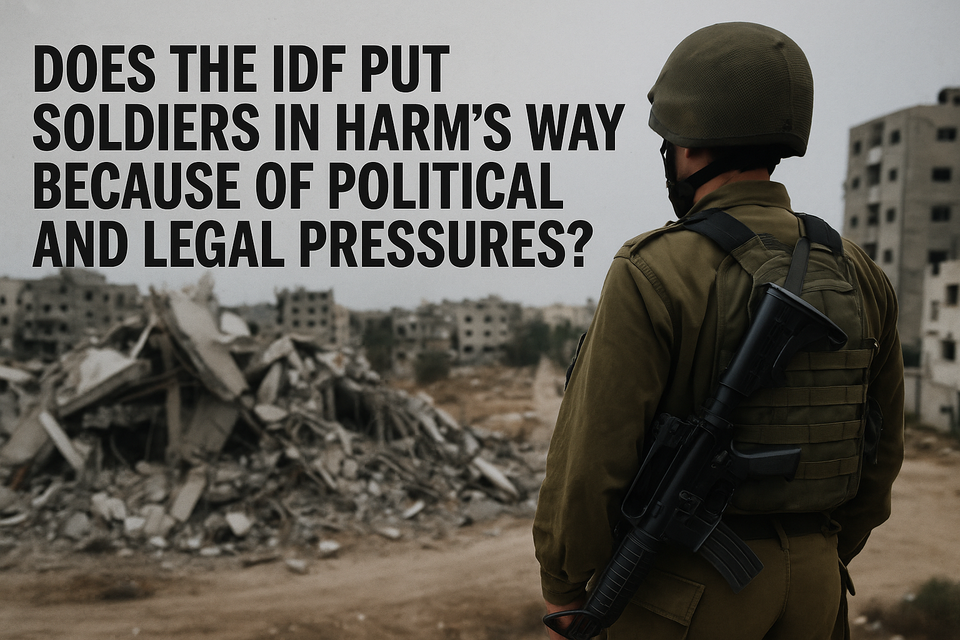Does the IDF Put Soldiers in Harm’s Way Because of Political and Legal Pressures?

Yes. Tragically, there are well-documented cases in which the Israeli army has knowingly placed soldiers at higher risk—risking injuries and fatalities—not due to lack of capability, but due to political calculations or legal restrictions imposed by internal and international pressures. These decisions are not based on Torah values but on secular ideals, which often prioritize international opinion, media coverage, or perceived morality over pikuach nefesh, the preservation of Jewish life.
Real-Life Testimony: Brig. Gen. (Res.) Oren Solomon
In a powerful interview, Brigadier General (res.) Oren Solomon—former commander of the Gaza Division and senior figure in the Prime Minister’s Office—warned that legal advisors and political constraints have shackled the army's ability to fight effectively and protect its soldiers. Since Operation Cast Lead, army lawyers have been embedded in all levels of operational planning, including fire control. Every target must receive legal clearance. Even when a terrorist is located in a house, legal teams may block a one-ton bomb to avoid damaging neighboring homes, requiring smaller weapons and time-consuming evacuations. By the time it's allowed—the terrorist is gone.
Solomon described this legal influence as having “gotten out of control.” On October 7th, even during a massacre, IDF lawyers continued to enforce the same legal restrictions as before. Commanders have been “paralyzed.” Dozens, if not hundreds, of military targets have been lost due to these constraints, putting soldiers in direct line of fire.
His words are chilling:
“It is as if a boxer has been bound hand and foot, blindfolded, forced to hop on one leg, and still expected to win.”
Solomon stressed that the population in Gaza is not innocent, having elected Hamas and supported them. Yet the army is forbidden to displace civilians—even if they shield terrorists. He notes that international law would allow more force than we currently use—but the IDF voluntarily imposes stricter guidelines. The result? Terrorists live, and soldiers die.
Torah’s Perspective: Pikuach Nefesh First
The Torah is unambiguous: Jewish life comes first.
“וּבַחֲיִתֶם בָּהֶם” “You shall live by them” (Vayikra 18:5) Chazal learn from here that mitzvos are meant to preserve life, not endanger it. Only three mitzvos override this rule—idolatry, murder, and illicit relations (Sanhedrin 74a). Going to war with unnecessary risk—especially when commanded by secular leaders without Torah values—is not only dangerous but may violate Torah.
Furthermore, the Torah does not shy away from how war should be conducted. In Devarim (20:10–13), Hashem lays out a system that is both ethical and effective. Chazal and the Rambam (Hilchos Melachim U’Milchamos, Chapter 6) detail how war must be led by the Sanhedrin (may it be reestablished soon) and Torah leadership—not a secular military complex making decisions based on fear of CNN or the UN.
Our soldiers are often forbidden from fully defending themselves. In some cases, they've had to knock on doors before entering enemy homes. Lives have been lost because of these absurd rules. Torah does not allow us to place Jewish lives in danger just to appear moral to the nations.
Why This Matters for All Jews—Not Just Charedim
This issue is not a “Charedi” problem. Any Jew who keeps the Torah—whether Charedi, Dati Leumi, or traditional—should be deeply disturbed by these facts.
We are not saying soldiers aren’t heroes. They are. Every Jew who puts himself in danger to protect Klal Yisrael deserves our tefillos and respect. But the army itself—the leadership, the policies, the legal constraints—is not following Torah. This is not an army of Daas Torah, and it leads to tragic, avoidable deaths.
How Can the Dati Leumi World Justify This?
This is a painful and complicated question. Many Dati Leumi Jews sincerely believe that the State and its army are part of the geulah process. They see participation in the army as a mitzvah and a sanctification of Hashem’s Name.
But how can this belief stand when the army knowingly puts their own children in harm’s way, due to political correctness or fear of the world?
This should be a serious hisbonenus (introspection) for every Torah Jew. Even if one believes the army is needed or valuable, how can we allow our children to be led by secular generals who don’t consult Torah before making life-or-death decisions?
If a commander is told not to attack a terrorist because a lawyer is worried about foreign media, and that decision leads to a Jewish soldier’s death—is that not pikuach nefesh? And do we not have a halachic responsibility to avoid such danger?
As Rav Elazar Menachem Man Shach zt”l famously said:
“The State of Israel is not the beginning of the geulah. A geulah that begins with desecration of Shabbos, uprooting Torah, and spiritual destruction—cannot be a geulah.”
We must care about our brothers in uniform. And because we care, we must ask: How can we send them into danger under secular leadership, without Torah guidance, when even army commanders themselves say the system is broken?
Conclusion: A Torah Army Must Be a Torah Army
Until Klal Yisrael has a government and army that follows halacha, under Torah leadership, and fights our battles as Hashem commanded—we must be extremely cautious.
This is not about disrespecting soldiers. It’s about demanding accountability for their lives, and recognizing that no one—not even a general—has the right to endanger Jews for political reasons.
Our lives are in the Hands of Hashem—not the hands of lawyers in the Kirya.
